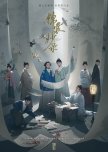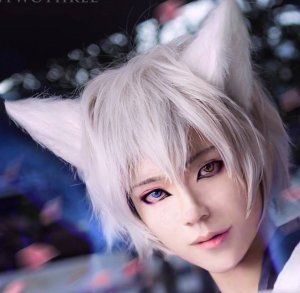
Follow Your Heart
Can one feel love, and love without a heart or with a mechanical heart? Though unthinkable, this story assumes a mechanical heart works just as good as a real human heart when it comes to love, maybe even better in times of trouble. As it is a fantasy, let’s just accept that people don’t need a real heart to fall in love; a mechanic heart works just fine, and can make a person fall in love just like a normal person does.This drama is narrated from the perspective of Jiang Xiao Ning (Xing Fei aka Fair Xing). 10 years ago, she got into a car accident and Gu Chuan (Ren Jialun aka Allen Ren) was there trying to save her, and got hurt himself. 10 years later, they meet again without recognizing each other initially. And they fall in love.
Gu Chuan is a very talented young architect, but he has a secret: he doesn’t have a heart, he lost it in the car accident while he tried to save Jiang Xiao Ning, and in its place, he has a mechanical heart. He knows his heart will one day expire and he will die. Imagine how difficult it is to live a life constantly reminding oneself of death, and this is what Gu Chuan has been tormented for the last 10 years; he has been preparing for his imminent death. His mood is always somber and dark as he cannot have excessive emotions with his mechanical heart. He also doesn’t want to love nor be loved because he wants to avoid any heart breaks in the event of his death. He’s like a lizard, cold and hidden. Ren Jialun has a natural sour face which I’ve come to love. Looking like an adolescent yet with an air of maturity, he is perfect as the somber Gu Chuan who doesn’t smile. Ren Jialun is natural with this role as his sour face makes him very believable and his acting is not stiff.
Gu Chuan doesn’t expect to fall in love with Jiang Xiao Ning but he does because she gives him the kind of optimism he has never experienced before. Now life has meaning, which jeopardizes all his death plans.
Jiang Xiao Ning has a totally opposite personality from Gu Chuan’s darkness. She is sunny and positive despite of her bad lucks; she always views her glass as half-full and grateful for everything she has. She considers herself like a crow which people normally associate with bad luck. Jiang Xiao Ning is smart, considerate and protective especially of Gu Chuan. When they are together, there’s a big contrast of the two characters: Gu Chuan dresses immaculately and somber, whereas Jiang Xiao Ning is sunny and active, and dresses in oversized clothing. Their chemistry may not be 100% but their romance is quiet and rather sweet. As two unlikely people come together, cold becomes warm, bad luck becomes good luck. And sorry to disappoint viewers, there are no hot kisses, as expected. Most of the presumed kisses are zoomed out and blurred. Any closeup kisses are so close that no one knows if the lips belong to the same actors. Xing Fei’s bright eyes that seem to smile forever fit her well into the role of the sunny Jiang Xiao Ning and her acting is very convincing, especially when it comes to her heart breaking scenes.
There is an over-powering second couple with overly mushy dialogues which feel overdone and banal. However, they also give viewers some hot kisses. There’s also something nefarious lurking under the sweet romance, with murders and corruption which gives some fireworks to the otherwise rather bland story.
OSTs
This drama produces some of the best sound tracks. I particularly love the beautiful song “Exchange” sung by Zhou Shen. It’s so touching and amazing that it can bring tears to the listeners’ eyes. I also love the instrumental music played by the cello when Gu Chuan is alone in his deep thinking, reflecting his torments.
My Verdict
If you like love triangles, there are plenty here. Both male and female leads have their respective secret admirers who become the antagonists and attempt to cause harm to their love competitors, but each time, their attempts are thwarted, either because our leads are smarter or plain dumb luck they have.
I love Gu Chuan’s philosophy in his designs, merging western architecture with Chinese wisdom and culture. Facing death is frightening, knowing it’s coming to take one’s life anytime soon. This drama helps us feel how it’s like for Gu Chuan.
Overall, the drama is not bad, neither is it excellent. It has some tropes, such as splitting up in a relationship for-their-own-good stuff, which can be rather annoying. The comedy can be rather stale at times. There are some minor flaws here and there but not enough to destroy the story.
Despite a rather bland story, there are some good lessons here. As Gu Chuan is teaching Jiang Xiao Ning, "It doesn't matter how others look at you, most importantly you cannot look down on yourself. Crow is the bird that most looked down by people, but they have their quality - they know how to put a nut in the middle of the road and let passing cars crush it. They are devoted to their partners and will forever remain faithful to that same partners." (I didn't know that.)
In turn, Jiang Xiao Ning teaches Gu Chuan, life is not forever. Life, no matter how hard it is, we must persevere. Be positive. Look at the positives. Take life as it comes and make the best of it.
I would have awarded this drama a 8.5/10 but the OSTs are so good that a 9/10 seems to be more appropriate. Fun watch. Must listen to the song "Exchange" by Zhou Shen.
Was this review helpful to you?

How to be a Family
The idea of a contract marriage, and seemingly a child from a previous marriage, didn’t appeal to me initially. But how the story is being told and how everything unfolds make this drama a very worthwhile watch. All the characters are lovable despite each has his/her flaws, making them believable. A child is always the center of attention, and here this cutie is the most adorable child in recent dramas. What seemingly a fake relationship and marriage that initially try to address the psychological issue of the boy by giving him a complete family that he craves, have become a real outcome as the fake parents fall in love.He (pronounced as “her”) Qiao Yan (Wei Zhe Ming aka Miles Wei) is the CEO of a conglomerate owned by his family and a single father. He loves and dotes on the child, at the same time tries to discipline him like an adult. The outcome is ineffective and hilarious until he meets Qin Yi Yue (Hu Yi Xuan), a child psychologist. Seeing how readily He Wei Fei aka Xiao Bao (Lennon Sun) takes Qin Yi Yue in as his own mother, He Qiao Yan coerces Qin Yi Yue into a contract, with high compensation, to be a pretend mother of Xiao Bao and a pretend Mrs He, for he is a “number” guy who does everything in black and white. Little does he know he falls head-over-toes in love with Qin Yi Yue himself. He misses and thinks of her whenever she’s not around, and he would find ways and means, using Xiao Bao as an excuse, to see her. The interaction is cute and hilarious. The family dynamics are warm and pleasing. What seemingly two very different personalities, he is meticulous and analytical, and she is spontaneous, come together and form an enviable family with a ready-made son.
He Qiao Yan is a person who doesn’t express his emotions very well and openly. He doesn’t understand human relationships and has lived a monotonous life. In other words, He Qiao Yan is a boring person and Wei Zhe Ming captures that 100%. Despite being an immaculate person, I really love how he acts to protect Qin Yi Yue by dropping everything he’s doing and come to her rescue. He Qiao Yan may be a genius in everything but is an idiot in love relationship.
This is my first drama of Wei Zhe Ming. At the first look, he didn’t appeal to me. But he grows on me and by the end of the drama, I find him the most eligible single father to die for. His acting is so convincing with small little facial expressions such as a raise of the corner of his eyebrow, a blur look on his face etc, capturing all the essence of his character.
Qin Yi Yue is disorganized, intelligent and quick witted. Despite being a doctor, she is not very health conscious as she feasts on junk food. She finds He Qiao Yan a weirdo initially but moved by him when she sees his devotion for the child who is not his, and his consideration for her well-being unspoken. Their love development is gradual and solid.
I have liked Hu Yi Xuan’s acting in “Sleepless Princess”. I find her charismatic with an air of freshness and authenticity. Here as a child psychologist, she is soothing and gentle. Even at times of helplessness, she still smiles with tears and resignation in her eyes.
Chinese dramas will not be complete without some tropes such as arranged marriage for economic benefits which is not much different from marriages of the old days among the royals. And of course, there are the side couples who are also the best friends of our ML and FL.
My Verdict
This is a very enjoyable drama most romance buffs will love. I love it myself. It’s funny and light, especially when it comes to dealing with the child. The parent-child dynamics are really fun to watch. Both main lead characters are mature with a tsundere ML and a warm and approachable FL. Although some parts of the editing are lacking, it hasn’t turned into a disaster and ruined the story. Overall, this is a wonderful drama not to be missed.
Was this review helpful to you?

Authentic, Moving, A True Treasure of 夫妻一唱一和
"Destined" is like a breath of fresh air in the world of historical dramas, breaking free from traditional norms with its liberal ideas. Forget about bloodlines determining the monarch or sticking to one family name, this story embraces diversity and challenges the importance of lineage. Gu Jiusi toys with the idea of giving his children different last names, mixing it up like a name buffet! Talk about breaking the rules!Our leading lady is a timid girl who finds her groove and inspires others to do the same, even that "bad" boy who transforms into a remarkable person. And of course, we have the ultimate villain who's the result of a dysfunctional family. That's one twisted family reunion!
Let's talk about Gu Jiusi, the lovable slacker from the wealthiest family. Sure, he has a reputation which is not so flattering, but deep down, he's got a heart of gold. Bai Jingting nails the role, bringing a playful charm and an unexpected sincerity to the flamboyant Gu Jiusi. He's like a lovable troublemaker with a heartwarming twist!
Now, Liu Yuru, our girl-next-door. She starts off powerless, a puppet of fate. But as life throws her curveballs, she discovers her inner strength and uses it to help her family and support her husband's journey to greatness. Song Yi portrays her beautifully, capturing the delicate yet strong essence of Liu Yuru.
And let's not forget the rest of the cast! From the one-dimensional characters like General Zhou Gaolang to the weak and insecure Fan Yu, everyone brings their A-game. Bravo, folks!
My Verdict
The underlying theme of "Destined" is all about harmony, and they drive that point home! Forgiveness, unity, and letting go of hatred are recurring motifs throughout the story. It's all about finding inner peace and spreading good vibes. Gu Jiusi sums it up perfectly when he says, "Nothing is bad or evil in this world. Stay true to your heart, live happily, and leave no regrets behind." Wise words.
This drama is like a sweet duet, with every note harmonizing perfectly. Sure, there are ups and downs, but in the end, you're left with a blissful feeling. It may take its time to unfold, but hey, good things come to those who wait! So, grab some popcorn and dive into this world of good triumphing over evil, light conquering darkness. It may be slow at times, but trust me, it's worth the watch. Don't miss out on the "Destined" magic!
Bravo!
Was this review helpful to you?

Amazing story! Inspiring Characters! Incredible Acting!
This is a story with a setting in a closely knitted community in South China in the 80s at the onset of the country reopening its door to the outside world. The drama depicts vividly the life experienced by common folks where street gangsters roamed and interwove into the fabric of the society. Life was tough as the country rebuilt its economy, healed from the devastation of the revolution, and stepped onto the world stage.The Story
The story is narrated from the POV of Yi Dongdong (Niu Junfeng), one of the main characters in the story. He recounts how he has come to meet Ma Xiaoxiao (Tan Songyun aka Seven Tan) and Ou Xiaojian (Xu Weizhou aka Timmy Xu) and how the two have inspired him. Though secretly in love with Ma Xiaoxiao and his love is never being reciprocated, Yi Dongdong is happy with this status quo for years from high school till adulthood.
Ou Xiaojian and Ma Xiaoxiao have grown up together on Mayang Street, a very tightly woven community where everyone knows and helps each other in times of trouble. Both Ou Xiaojian and Ma Xiaoxiao are soulmates and later become lovers to each other. They are role models in their neighborhood and in school with highest ranking in their academic studies. Tragedies strike repeatedly in Ou Xiaojian’s life and he grows up fast. While all the kids around him still in school, wondering what life is all about, he drops out of school, enters the police academy and is thrusted into a world that even most adults cannot handle. Unbeknownst to all, he becomes a mole for the police. To gather information, he hangs out with gang members, rendering everyone thinking he has turned rogue. Daily he’s involved in gang fights and getting hurt bloodily. His mission is to collect evidence to flush out the kingpin of the organization that has a seemingly clean façade, but deeply involved in money laundering, black market, smuggling, human trafficking, frauds, cheating schemes, street gangsters, and it has a giant network that spans to multiple cities and countries.
It is both happy and sad how the story ends. It makes me cry and my heart aches for my hero. I know deep down inside somewhere, Ma Xiaoxiao still remembers Ou Xiaojian dearly and cries for him.
The Characters and The Acting
The Ou Xiaojian character is a very difficult role to portray as he is multi-dimensional. On one hand, he’s a normal kid just like everyone on the same street. He goes through the same growing pains like others. But on the other hand, he has to act tough and fearless to protect those he loves. When he becomes a mole for the police, he has to act like a bad kid to blend in with the gangsters, talking rough and mean. Son of a dead police officer, he has a heavy burden on his shoulder that he cannot let anyone see. Misunderstandings are left unexplained because he can’t; he’s always in a predicament because he doesn’t want to purposely hurt the people he cares for. He is altruistic and magnanimous, and takes care of the kids in the neighborhood and helps them grow like a big brother, he's their guardian angel and everyone looks up to him. He's inspiring and very filial pious. And yet, life is cruel to him. Like his grandmother, I’m constantly fearful for Ou Xiaojian, fearing for him getting hurt again or even getting killed. Though I smile every time he comes on screen, as he gives viewers the security that Ou Xiaojian would take care of everything and everything would be fine, I’m fearful for him. The writer has successfully captured our sympathy for the character and brought out the motherly instinct of the viewers.
Actor Xu Weizhou has a baby face that plays well as the character of a 17-18 year old teenager as Ou Xiaojian. His ‘bad-boy’ aura makes him a very convincing gangster, albeit the best looking one, with a perfect physique even among the many Chinese actors. At 185 cm height, his long legs and strong chest make his every action move extremely good to watch; he’s really an eye candy for many viewers. Either riding his motorbike, running, kicking in fights, wearing his black biker outfits, he exudes a charisma no others can match. By the end of the drama, Ou Xiaojian has become my hero and Xu Weizhou gets enlisted on my favorite actor list.
Ma Xiaoxiao lives just across the street from Ou Xiaojian’s shop/home. They love and care for each other, watching out for each other’s back constantly. Ma Xiaoxiao is mature and commanding. A role model for her street and school, she is their big sister. She pulls the kids up when they lag behind in their studies. She’s their voice in school. Her friends love her and would fight tooth and nail to help her. Just like Ou Xiaojian who sacrifices for others, she sacrifices herself to make dream come true for her sister.
Tan Songyun has done it again, this time as Ma Xiaoxiao, an 18 year-old high school girl. At her actual age of 30, she continues to amaze me for transforming herself into a teenager playing the roles so effortlessly and convincingly.
I really enjoy watching the moments when Ma Xiaoxiao and Ou Xiaojian are together, not doing much, just holding hands, heads leaning on each other or gazing into each other wordlessly. Those moments really create ripples in my heart; their chemistry is exploding.
There are numerous veterans here, and multiple young actors, all giving their tip top performances, bringing alive the characters, making us empathize and love them.
The Official Sound Tracks
This drama produces numerous wonderful sound tracks, in particular the OST We Suddenly Grow Up, reminiscing the bygone childhood from the voice of a youth, and the OST Remembering You accompanied by a harmonica intensifying the melancholy, conjuring memories of a lost love.
My Verdict
This drama is one of those that once you start watching you cannot stop because the characters just pull you in.
This is a story with a lot of complexity. Its characters are multi-layered. Its attention to details is commendable. Many norms of the era are captured and depicted vividly here, such as how precious soda was for a child, how a big deal a pair of blue jeans was, televisions and phones were considered as luxuries. Private facilities were rare and common bathrooms for the whole community were the norm. Or the cooking of spicy or fermented foods that stunk the whole street. People living together like a big family, laughing and crying on each other's shoulder. The family dynamics and interpersonal relationships are being written so well that, these are all the small details that make this drama so relatable and endearing. It does make me ponder what does it mean by “a meaningful life”. Would one be happier living in a community like they do on Mayang Street, or like we do individually away from loved ones? No doubt there is a lot of conflicts living in a community like that – parents and neighbors fighting all the time, and secrets become public knowledge in no time.
This drama brings out the resignation and humor of life. At the beginning of each episode, the writer provides a lesson learned in the ensuing scenes with a fine statement for the viewers to ponder, successfully capturing the experiences all of us may have encountered in life. Sad as it is for a short young life of Ou Xiaojian, we should also celebrate him for living a life that he finds meaning in. The writer has successfully given us a very inspirational character.
A wonderful story that makes you keep thinking about the characters. TWO THUMBS UP!
Was this review helpful to you?

A Hidden Gem
The Kingdom of Great Chu is a female-centric world where women’s and men’s roles are flipped. Women hold power and important office, whereas men stay home and do house chores, tend to the kids and are subservient to their wives. Here, we have a female emperor, and all the generals and ministers are women, and a powerful female shizi (世子) who holds the prestigious title inherited through her family. All families’ heritance and titles are to be passed down to daughters, and men are to be married into the women’s households. Courtesan houses are popular where men serve for the women’s pleasure.Shen Ye (Yuan Hao) has fallen in love with Shu Cheng (Jia Ze aka Claire Jia) since they were both kids because she had shown kindness towards him. From then, Shen Ye disguises as various characters and hides within her circle, secretly protecting her. As the intelligent shizi, the Emperor is threatened by her prowess and military power her family holds, and secretly sends out assassins to kill her. Time and time again, assassinations fail because Shen Ye always protects her in the dark, and she always comes out unscathed.
After saving Shu Cheng yet again in an ugly humpback cover that leads to her falling in love with him, Shen Ye changes his identity and reveals himself to her as the owner of Feng Lou, a courtesan house where wealthy women come to drink and to be entertained by male courtesans. Here, Shen Ye is considered as a stunning beauty in the Kingdom of Great Chu. He is charming and fast to please, frivolous and loves money dearly; but all these are on the surface. Under that good-looking skin, Shen Ye is intelligent and schemeful; he is always ahead of everyone around him, and always has a solution for every problem he encounters. He has multiple identities which add additional mysteries to his character. Despite being such a complex character, Shen Ye is devoted and willing to give up everything for the one he loves. He has so many secrets that he says he would reveal to Shu Cheng at the appropriate moment, this has created a lot of hilarious suspicions and misunderstandings by Shu Cheng. How Shen Ye continues to overcome such obstacles and maintains Shu Cheng’s love for him is brilliant.
I am intrigued by the Shen Ye character. I almost spit out laughing when he wears a veil covering his face when appearing in public or meeting with other women (think of ancient women wearing veils). His visor-looking veil is really ugly and looks funny on his face. Perhaps this is the purpose – to make viewers laugh. Yuan Hao’s portrayal of the character is very believable. He has a face that can look feminine (to be called beautiful in the land of Great Chu), and yet he is also very masculine.
Shu Cheng has to pretend to be a playgirl to make the Emperor let down her guard and stop wanting to kill her. So, she frequents Shen Ye’s courtesan house and proclaims he is hers; she tries to look as bad as possible. She is taken by surprise when she finds out that the man she’s being decreed to marry by the Emperor is Shen Ye under a different identify, Su Rongqing, the only son of one of the Emperor’s high ranking ministers. Even after they get married, Shu Cheng still doesn’t fully know Shen Ye’s real identity and what is under his sleeves. She loves him and yet doesn’t trust him, whereas for Shen Ye, he respects and loves her with no holding back. Despite their sweet romance, the secrecy spurs the plot on.
This is the first aired drama for Jia Ze playing a main lead. I find her acting better than many better known names. As the shizi, Jia Ze manages to bring out her commandeering charisma, courage, earnesty and upstandingness, and yet she also shows her feminine side when she is tormented by the conflict of her love for a man whom she believes to be a usurper, and her love for her country that she swears to protect. Jia Ze is natural and convincing.
The second couple is amazing with a very compelling story. Both Li Zhehao and Peng Yaqi (aka Yakisa) put up a fine performance as a heart-wrenching couple, Shen Cong and Murong Wanqing, who endure revenge and love, romance and guilt. The Murong Wanqing character reminds me of the sweet-silly characters played by Zhao Lusi. In fact, Peng Yaqi and Zhao Lusi look somewhat alike in their aura and demeanor under certain instances.
My Verdict
Unusual, refreshing, great plot, captivating storyline, intense, lovely characters, good humor, sweet romance, fine writing, directing and production. Unfortunately, not many viewers are watching this wonderful drama because decent English subtitles are not available at the time of airing, therefore, the rating here is lower than it deserves.
An enjoyable watch. Don’t miss it!
P/S: A sneak peek of next season seems to be dark and even more intense with amnesia, deaths, and protagonists turn antagonists.
Was this review helpful to you?

Fast Moving, Amazing Chemistry, Girl Empowering
The Autumn Ballad is an intriguing suspense romance story with strong male and female leads. Interestingly, the development of the story is almost distinctly divided into 3 sections: first section being both the main leads meeting and hating each other and yet they’re forced to work together to survive; the middle section being the main leads starting to warm up to and discover each other with many sweet moments together; the final section being they falling in love and fighting their adversaries hand in hand.Qiu Yan (Qiao Xin) is not a conventional girl of her time. Having gone through a lot of hardship and heartaches growing up, she is strong, proactive and knows how to fend for herself without letting fate dictate her. During her mishaps, she meets Liang Yi (Jeremy Tsui) who is a ruthless cold hearted investigator. At first, Liang Yi thinks Qiu Yan a gold-digger, using her dirty schemes to land a big fish for marriage. After working with her to solve various criminal cases, Liang Yi changes his view of Qiu Yen and she begins to attract him. Mutually, Qiu Yan doesn’t like Liang Yi initially because she thinks he is cruel and heartless, but after working with him for a while, she realizes that’s just a façade he puts up to undermine others. Under that face is a kind and caring person who has helped her again and again. She begins to take an interest in him. Their interactions for the first 20 episodes or so really feel like a rom-com, with smearing and sarcasms against each other which is really fun to watch.
As they begin to develop feelings for each other, a few episodes are devoted to show their romance and this thrills many viewers. After episode 20 or so, it is an open fact that they are a couple without declaring their feelings to each other but each knows the other’s heart. They are almost inseparable solving mysteries and a huge conspiracy while saving each other’s life with their own. For many romance buffs, it is satisfying to see a couple that reads each other’s mind so well, and they give the viewers a lot of sweet moments; their chemistry rocks.
I didn’t quite like Jeremy Tsui when I first watched his work in Legend of the Phoenix. His pale face, sly smile had made me uncomfortable and I wasn’t even sure if he wasn’t an antagonist. But in this drama, I find his acting very believable with his minute expressions and overall charisma. I particularly love the scene when Qiu Yan tells him she’s the girl he has rescued years ago. His facial expression is priceless. Like many viewers, I am attracted and mesmerized by his magnetic deep voice, though some viewers criticize his unclear articulation in his dialogues. This is my first drama of Xiao Xin and I find her beautiful and natural. I really enjoy watching her especially when she starts her bickering with Liang Yi. Her look and emotions are adorable and convincing. The other characters are equally well executed by the cast.
My Verdict
I like this drama very much at the beginning for the first 20 episodes or so. Though I love their romance in the later episodes, somehow, the story starts to lose its appeal in the later episodes. There are still twists and turns, but no more surprises as things become predictable. Many unfathomable logic (such as how can one work closely with a person who has just killed the person who is like a brother to you?) starts to creep in. There are various such logic flaws throughout the drama – working with someone who has killed one’s loved ones. For the later episodes, Qiu Yan seems to be smarter than Liang Yi who has been a brilliant investigator in solving cases for years, and he is supposed to be the best who can see the bigger picture instantly before anyone else can. So it seems like a change in capabilities of the characters. As with the lazy writings of many Chinese historical dramas’ endings, this drama doesn’t escape the same fate. Quite a few of the prominent side characters perish unnecessarily. Though there are many plot twists which are unexpected, I find the final twist that causes the life of one of the characters rather needless. It leaves many questions marks on my mind.
Having said that, I have truly enjoyed this drama and its conspiring couple, both witty and share the same belief. These two love birds are like a pair of duets, always harmonizing each other. It is so good to watch this type of relationship. I also find Qiu Yan very inspiring as she doesn’t leave her life to her fate - she constantly reminds the viewers that.
This is a fine drama that I strongly recommend despite some of the flaws mentioned here.
BRAVO!
Was this review helpful to you?

Torments, Melancholy & Emotional Turmoil For The Promise of Forever Peace
Accordingly, the Promise of Chang’an is a remake of the 2002 drama The Epic of Xiao Zhuang which was set in the Qing Dynasty. In the earlier drama, Empress Dowager Xiao Zhuang was in love with a general but forced to marry the general’s brother instead. Her son subsequently succeeded the throne and she continued to help her grandson who later came to be known as the Kangxi Emperor. The Promise of Chang’an draws many parallels from the earlier drama, with the setting in a fictional kingdom and era.As I was pondering the title The Promise of Chang'an, I came to the realization that it has not meant the city Chang'an but its literal meaning as "forever peace" because the city Chang'an has not been a main feature of this drama except a by-passing event when Xiao Chengxu seizes the city. The literal meaning of "forever peace" makes more sense in this context: The Promise of Forever Peace which is the epitome of all the sacrifices Helan Mingyu and Xiao Chengxu have contributed throughout the story. They have sacrificed their whole life in order to achieve peace for the country. The brilliant use of "chang an" here by the writer is applaudable.
This drama is not for the faint of heart. I love historical stories based on real life characters and yet I still find this story depressing as it continues to give the viewers the sense of hopelessness and helplessness. The author has successfully captured all the pains in life as described in the Buddhist seven bitterness: birth, old age, sickness, death, hatred, separation, and yearning. This is a story with convoluted plot, layered storyline, and multi-dimensional characters. Our main characters go through despairs episodes after episodes.
The Promise of Chang’an was made prior to Love and Redemption but only aired after the latter. Therefore, upon completion of Love and Redemption, many viewers (like myself) have come to watch this drama for Cheng Yi, and sure enough, his torments and crying continue. Every episode of this drama is beautifully written and acted, but extremely painful to watch because of the torments our characters have to endure.
The Story
A young princess Helan Mingyu (Zhao Yingjuan) from the northern kingdom meets the young 9th prince, Xiao Chengxu (Cheng Yi) of the Sheng Kingdom, and they fall in love with each other. Hoping to make a name for himself and return to marry Helan Mingyu, Xiao Chengxu goes off to war. Little does he know his brothers want him dead in battle; they set him up to be killed. When news arrives that he’s dead, Helan Mingyu is devastated. At the same time, the Sheng King Xiao Chengrui who is Xiao Chengxu’s older brother, asks for her hand. Out of no choice, she agrees. When Xiao Chengxu makes it back, she’s already become his sister-in-law. Since then for years, the duo endures the pain of lost love, each walking on thin ice every day. The torment is so great that, even as viewers, it is unbearable.
When Xiao Chengxu finds out the truth about the death of his mother and the will of his late father appointing him the heir but stolen from him, he vows revenge and to take back what is rightfully his – the throne and his love. However, time and time, his schemes fail due to various reasons, and he’s saved by Helan Mingyu from death again and again. Deeply, their love for each other never wanes. Things become even more complicated when Helan Mingyu gives birth to the child of Xiao Chengrui who is now the Emperor. When the Emperor dies, he passes the throne to Mingyu’s 6 years old son, Xiao Qiyuan and Xiao Chengxu becomes the regent.
Xiao Chengxu tries to treat Xiao Qiyuan as his own son and groom him to be a wise emperor, but the results are not what he has expected; the little emperor is spoilt rotten by the two dowager empresses and becomes a bratty tyrant. At the turn of events when dethroning his nephew the tyrannical emperor becomes impossible as Mingyu constantly protects her son and plays Xiao Chengxu out, the death of his little brother and friend, Xiao Chengxu loses all hope to continue living.
At this point, most viewers are disgusted by Helan Mingyu’s actions and how she has treated Xiao Chengxu who continues to be a poor lovesick boy. I've been trying to give credit to Helan Mingyu and empathize with her for the actions she has taken in situations that she has no control over. I can feel her predicament: on one hand, she's still in love with Xiao Chengxu and wants to elope with him, on the other hand, she's the mother of the Emperor and she knows if she were to run away with Xiao Chengxu, the country would descend into chaos as the young Emperor is still too naive and gullible, and can be easily manipulated by those who are eyeing at the throne. Giving up the throne is not an option as she knows there would be a lot of bloodshed, including losing all her loved ones. Until the end, Helan Mingyu is still Xiao Chengxu's Achilles’ heels: he would do anything for her, even giving up his own life.
Episode 50 is probably my favorite episode, and yet it's also the saddest. I cry for the painful loss, Xiao Chengxu's selflessness and miserable life. At the same time, it also feels like a stone lifted from the heart; all the knots from the beginning have disappeared after episode 50. Xiao Chengxu maintains his dignity and becomes an immortal. The final chapter has ended, and the epilogue begins. I sigh a sigh of relief.
The Acting
Xiao Chengxu is a very difficult character to portray. On one hand, Cheng Yi has to show his torments to the viewers, on the other hand, these torments have to be hidden from the eyes of those around him, in particular, from the Emperor. As Xiao Chengxu, he grows from a care-free risk-taking youth overnight to a patient, calm, strategic, mature, calculative person when he loses his mother and lover. Xiao Chengxu’s crying at his losses is so painful to watch that viewers cry with him. This is some incredible and brilliant acting and I salute this actor whole heartedly. Cheng Yi is an amazing actor. He has an air of melancholy surrounding him and a poker face which tailor-makes for the Xiao Chengxu character who has to hide his emotions at all times in order to survive the palace politics. Tormented by love and duty, Xiao Chengxu’s emotional turmoil is incredible. His crying really rips the viewers' hearts out. The character is a miserable character living a miserable life. Cheng Yi has successfully brought all these out on the screen for the viewers. Incredible acting!
Helan Mingyu is another difficult character to portray. At the beginning of the drama, many viewers criticize the use of Zhao Yingjuan (aka Sarah Zhao) as Helan Mingyu because she looks too mature for the role. As a 16-17 years old wild girl from the steppes, it is indeed a hard sell; Zhao Yingjuan is very lady-like, gentle and soft. However, as a consort later, she is beautiful, elegant and regal. Still, many viewers are not convinced by her performance complaining that she has few expressions on her face; most of her expressions are either apologetic or indifferent. It’s hard to see her heartache and resignation despite those are supposed to be the situations she's in. Her role also seems confusing. Many viewers conclude that she’s just been very selfish and unlikable. For me, I can feel Helan Mingyu's pain and her resignation. She has to hide all her feelings inside, no matter what. Watching her, I can feel I'm almost exploding with feelings but at the same time, I'd have to exercise self-restraint to suppress those feelings. It's extremely hard to play and Zhao Yingjuan has successfully achieved that.
All other cast members put up equally incredible acting. All the costumes and settings are beautiful, appropriate and believable.
My Verdict
The Promise of Chang'an reminds me why I didn't like to watch historical dramas in the old days, in particular the palace genre. This is because most of these stories are very heart-breaking, portraying all the pains of human life. I have become "braver" in the recent years, consuming historical dramas as soon as they're airing. Most of these are pretty light-hearted. The Promise of Chang'an is one of those once-in-a-blue-moon type - sad, depressing and yet realistic.
This is a heavy drama with a lot of torments and emotional turmoil. It is not recommended for viewers with depression or high blood pressure as the story may make you feel so helpless and hopeless which is indeed a rotten feeling. Having said that, this is a very well written and produced drama. There are no apparent plot holes nor flaws. Everything is tied up properly and concluded plausibly. Most of all, Xiao Qiyuan and Helan Mingyu have both redeemed themselves towards the end. Despite how some viewers have condemned the storyline and how unsatisfactory they feel some of the characters are being written, I have thoroughly enjoyed this drama. For me, this is how a drama should be written, directed and acted. This is a story of forbidden love, regrets and resignation. Power, duty and country take over.
At this end, I've always pondered, is it ever possible for a love like what Chengxu and Mingyu share, after everything that has happened between them, to last for decades till death, and hence how realistic this drama is? And yes, perhaps it does exist. I find the answer in the current British royal family, Prince Charles and Camila Bowles. Their story could be quite an excellent live example. Only that this British couple has a happily-ever-after ending.
Incredible story. Incredible production! TWO THUMBS UP!
Was this review helpful to you?

Light And Yet Dark
This is a very delightful drama with comedic acting and jokes, at the same time, it is also dark with bloody plots and mysteries. Accordingly, it has been adapted from a novel and the characters have been drastically rewritten rendering dissatisfaction from the readers. There are many twists and turns, and with great endearing relationships between the main couples and the overall family as a whole, this drama is a rather entertaining watch.The Story
Ju Mu’er (Xiao Yan aka Shane Xiao) is the daughter of a wine maker. In her daily business transactions, she encounters a miser, Long Yao (Xing Zhao Lin) who is a shrewd businessman running the largest conglomerate in the land. He has deep pocket and has a formidable relationship with the palace. Ju Mu’er is also a virtuoso of the Guzheng. When her shifu is framed and executed, she's determined to find the truth behind his death. Long Yao helps her after falling in love with her. Together, they go through ups and downs, marry each other three times (hence the Chinese title for this drama), and risk losing everything including their lives. Their entanglement also endangers their own family members whom they love dearly. In the beginning, it’s hard to discern who the antagonists are.
Long Yao has an older brother who is the head of the royal guards and a younger brother who is the leader of the wǔ lín (martial arts world). They all live together in an exquisite mansion financially supported by Long Yao through his business income. The Long brothers, though have totally different personalities, love each other dearly and would do anything to protect each other. I love the scenes when they eat their meals together daily, bantering with each other. The Long family is very powerful because they have the royal family’s full support. Long Yao’s miserliness is egregious, making him incorruptible hence trusted by the Emperor and the Dowager Empress.
There are some deadly fights within the harem and some light palace politics. During Ju Mu’er’s investigation, both Long Yao’s brothers meet the loves of their life who are also embroiled in the mystery. The eventual outcome is delightful, giving the audience three beautiful pairs of lovers.
The Acting
Xiao Yan is one of my favorite actors but as Ju Mu’er, I can’t say I like her very much. Her acting here is not that bad, but her make-up is terrible. Her eye make-up in particular, has made her so uncomfortable to look at. On top of that, she has a constant smiling face which makes her sad scenes difficult to comprehend; one doesn’t know if she is happy or sad, giving the impression that her acting does not synchronize with the situations.
Xing Zhao Lin’s acting is not bad as the crafty and prideful Long Yao who loves his money and charges for everything including tea money for the match-maker. Everything he does is viewed as a business transaction. He is very smart but not particularly good in expressing himself to his love, Ju Mu’er, Xing Zhao Lin has convincingly brought out the miser and the prude Long Yao.
The styling for the major couple is quite unconventional for historical dressing. It has a hint of western style and the couple’s costumes are always matching each other’s like lovers’ his-and-hers.
My Verdict
There are some very enjoyable scenes, but somehow, certain parts of the story are also not very coherent. This is very likely that the screen writers have changed the original story from the novel without properly addressing the plotline, hence making it illogical with plot holes and flaws. Having said that, this is a story with mysteries, crimes, investigation and super villains. It is funny and cartoonish at times, and yet dark and bloody. There are strong brotherly relationship and trusted friendship, at the same time, betrayal, deceits and deadly misunderstandings.
Overall, this is a drama with an interesting plotline. Had the Ju Mu’er character been more consistently written and acted, this would have been a very good drama.
Was this review helpful to you?

一将功成万骨枯 (Yī jiāng gōng chéng wàn gǔ kū)
“For every champion lie thousands withered bones.” Most of the times, we see only the glory of a champion – an Olympic swimmer, a World Champion gymnast and skater - but we rarely see the struggles, sacrifices, obstacles, pressures, emotional turmoil that each has to endure. This drama brings us behind the scenes and helps us appreciate how such successes come with the price these champions have paid and the sacrifices made.This is a story about setting goals, perseverance, and overcoming failures. It is unexpectedly funny and enjoyable to watch. For the last decades, China has been consistently producing world champions in every sports in particular in table tennis. This drama gives us a peek at how these champions are created. Having played table tennis growing up, I have an affinity for the game and hence have enjoyed watching the matches and prolonged sessions at the table. At the end of each episode, table tennis is being explained in details: the terminologies, techniques, rules, competitions, etc. and I find myself enthralled.
The story depicts two very different characters: Xu Tan (acted by Bai Jing Ting) is scrawny, wimpy and lack of confidence, but kind, humble and friendly; Yu Ke Nan (acted by Xu Wei Zhou aka Timmy Xu), with a powerful athletic physique, is overly confident, arrogant, rebellious, impulsive and hot headed. The story begins when both are 17 years old in 2007, and follows their journey to become champions of the world. This unlikely “ying yang” pair becomes best friends and root for each other especially in their most trying period. Countless times, both get punished but unknown to them, their punishment is actually a form of training that helps them grow, such as raising pigs in a farm and becoming a janitor in a boxing gym. Daily details of the years are well taken care of with changing of technology and apparel over the years, from nameless flip phones to Apple smart phones, from Butterfly sportswear to Nike and Adidas.
The drama dwells deep into the various style of coaching by the national coaches and their relationship with their players. Xu Tan and his coach, Lei Cheng (Liu Zhi Bing), are like father and son. His coach inspires him, helps him discover himself and grow. Yu Ke Nan and his coach, Teng Biao (Wang Jian Xin), are like a pair of good old friends, continue kicking each other’s ass and calling each other names, at the same time, they love and trust each other. There is also a super strict coach who produces top ranking players but such players are also the most unhappy with high injury and burnout rates. Another coach has a soul mate relationship with his player, seeing their own shadows in each other. Every character has its flaws and faces personal obstacles. The development of the characters shows how they overcome their obstacles, grow and succeed.
Acting
Here in this drama, I discover Bai Jing Ting. He nails the role as the wimpy kid that grows to become the world champion. Bai Jing Ting has given us some amazing acting and he is so convincing as a world class table tennis player. Whether it’s his body double or not (I really can't tell), I feel Bai Jing Ting can play the game very well; he has the styles, his actions and shots are perfect. Xu Wei Zhou’s acting here is good too especially when he becomes the adult Yu Ke Nan. Like Bai Jing Ting, his playing of the game is immaculate and convincing, making Yu Ke Nan the most formidable table tennis player in the world. I really love watching them playing the game, and there’s a lot of such scenes to satisfy ping pong fans.
My Verdict
If you’re a sports fan and love table tennis in particular, you’d love this drama as it gives us many amazing real-life games with shots and fantastic camera work. Every smash, every torque, every curve is thrilled to watch and viewers can feel the excitement and satisfaction of the shots perfectly executed.
You’d see how China trains its youth, which is nothing like the western world. The greatest difference is, for the west, winning is for personal glory, whereas for the Chinese, it is for their national pride.
If you have watched “Hikaru No Go” and liked that drama, you may like “Ping Pong Life” too. To be honest, I like “Ping Pong Life” better because I find the character development better and more realistic, and it covers a wider range of three-dimensional characters. I love the part when the two leads begin to build their deeper understanding with each other, they really spend a lot of time, literally tied, together. They learn to feel and trust each other without words and the process in doing so is hilarious and adorable. This process is not captured enough in “Hikaru No Go”.
I really love this drama because it reminds me not to look at the glory of any success. We should not lament why we have not been as successful as others, whether in music, sports or anything else, but rather we should ask ourselves if we are willing to sacrifice everything to achieve success, and that’s the message in this drama.
A wonderful watch. Highly recommended!
Was this review helpful to you?

家和万事兴 (Jiā hé wànshì xīng) Prosperity Starts from Harmony at Home
家和万事兴 is a motto that is embedded in every Chinese people’s heart. This philosophical adage reflects in their everyday life and is vividly portrayed in this outstanding story. The Story of Xing Fu is partially adapted from Chen Yuanbin's novella The Wan Family's Lawsuit (万家诉讼) which was also made into a movie in 1992, Qiu Ju’s Lawsuit (The Story of Qiu Ju), directed by the acclaimed Zhang Yimou and acted by the gorgeous Gong Li. The earlier story was set around the 1980s when rural life was harsh, and the country’s economic miracle was still at its infancy.In this new story, The Story of Xing Fu, set in the late 2010s, viewers can see the marked improvement of village life compared to the 80s, but the rural-urban differences are still very distinct with the sophisticated urbanites looking down on the poor villagers; the divide is even more brazen now than the old days.
Xingfu (Zhao Liying) is a rural woman who is strong headed and lives life guided by her uncompromised principles of honor and integrity; right and wrong for her is black and white. Though not well educated, she would go all out to find justice when a person’s right is being infringed, for she is a person who would go all out to help whoever needs help. She is fearless to take on the rich and powerful if she needs to, because she believes the rule of law will always prevail. After she marries to a farmer, Wang Qinglai (Tang Zeng) from a neighboring village, she comes to live in the Wan Family’s Hamlet.
The Wan Family’s Hamlet is a settlement founded and led by Wan Shantang (Liu Wei) as the respected village head. The residents there are mostly Wan Shantang’s relatives with Wan (万) as their family name. Hence, the Wang (王) family, Xingfu’s in-laws, becomes an odd-one-out and feels like an outsider. For this reason, the Wang family always keeps a low profile and tries to please everyone especially Wan Shantang, hoping with the village head on their side, they would blend in more easily.
All disputes by villagers in rural China are usually settled out of court through intermediaries such as the village heads. Local police may be involved as a mediator to bring the disputing parties together to come to a settlement. This drama carefully portrays this side of life for most of the Chinese population (majority of the population still lives in the rural areas and small cities).
Therefore, when Xingfu’s husband was accidentally kicked by Wan Shantang in the groin, she is unhappy with such settlement and files a lawsuit against Wan Shantang, something that is out of the ordinary. As things eventually turn out, Xingfu is indebted to Wan Shantang, and the lawsuit is forgotten. But as everything is going smoothly for all, the law catches up with Wan Shantang and he’s imprisoned. Outraged by her action which is seen as being ungrateful by the villagers, Xingfu and her husband are forced to leave the hamlet to avoid their awkwardness at home and become migrant workers in the city.
Chinese families often sacrifice themselves and send family members who have the most potential to the cities to work or for higher education, in the hope that the ones that ‘make’ it would reciprocate and help take care of the rest of the family. The concept of investing in one person and when the person gets wealthy, he/she would help bring up the rest of the people, permeates the whole society. Wang Qinglai and his family work hard and send Wang Qingzhi (Liu Yanchen), Qinglai’s younger brother, to study and work in the city. When Xingfu and Wang Qinglai come to live in the city, Wang Qingzhi is expected to take care of them.
‘Guanxi’ (connection) and ‘renqing’ (favor) are deeply rooted practices of the Chinese tradition. As the government tries to weed out nepotism and corruption, such practices become prohibited especially in the cities. Wang Qinglai doesn’t realize the pressure and predicament he has put his brother in, as such tradition is viewed undesirably in the city. The drama tries to portray realistically the conflicts between the brothers in the job finding process.
There has been massive rural – urban migration in the last 40 years in China, causing unsustainable pressure in the cities. Rural farms are being deserted, children are growing up without their parents, and elderly parents are being abandoned by their city-bound grown-up children. Wan Shantang tells Xingfu that, though it’s a must to leave the village to see the world sometimes, she must not ever forget where home is. After all, life is meaningless if one loses one’s family. These heart-felt words are meant not only for Xingfu, but for all viewers alike: do not lose your family in the pursuit of wealth and materialism. In the end, you may end up with nothing. Silently the writer is telling the viewers that, wherever we may be living, family is where home is.
In this drama, Zhao Liying is not that glamorous girl. She's a typical village woman with unflattering hairstyle and old-fashioned clothing that is worn by most women in rural China. Her growth after living in the city helps her look more sophisticated later as an inn keeper, but most of all, she becomes more flexible and articulate for the well-being of all the residents of the Wan Family’s Hamlet. Zhao Liying’s portrayal is convincing, bringing alive the Xingfu character who initially has a one-track mind and later develops into a savvy business woman with compassion and understanding. She learns that not everything is as clear cut as in black and white; at times, there are the grey areas and she needs to be flexible enough so that everyone can live in harmony, as it goes, “Prosperity starts from harmony at home” and Wan Family’s Hamlet is home.
I really like the amicable, but straight-shooting Wan Shantang character who is kind and upstanding but occasionally impatient and explosive, and Liu Wei’s portrayal is so wonderful and authentic. Acting as his son Wan Chuanjia, Cao Zeng’s portrayal is equally good and believable.
Luo Jin plays a supporting role here as Guan Tao, the lawyer. As always, Luo Jin exudes an affable demeanor and though he’s not the lead here, his character is well loved, and his chemistry with Zhao Liying is wonderful although their relationship is only platonic. All in all, the whole cast puts in the best of their acting and every character has its flaws, and is realistic and believable.
My Verdict
Just as the brutal treatment of the Tangshan (China) girl’s incident came to the attention of world media recently, the airing of The Story of Xing Fu is timely. The beginning episodes of this drama almost eerily replicate what happened in the Tangshan incident and its handling by the authorities. It is sad to see how many similar cases swept under the carpet, each condoned by the society. There is a lot of injustices, class differences, and gender supremacy, which is an on-going issue, and is not unique only to China; it happens in many societies, including in the open west. I'm glad that Zhao Liying took up this project to bring awareness to the injustices in the rural Chinese society where women are constantly suppressed, discriminated, and wronged.
Director Zheng Xiaolong, who also directed the Legend of Mi Yue, one of my most favorite historical dramas, together with Director Liu Xuesong have brilliantly portrayed the lives of ordinary people in everyday rural China where much of the population lives, bringing out their challenges, ironies, and resignations in facing a changing world. The picturesque scenery of the village is breathtaking. This drama has no romance, no nail-biting plots, no mysteries, just plain slice of life. Many viewers may find it boring, but that's missing the point.
Sacrificing individual’s rights for greater good is touted in the Chinese society; benefits for the community is more important than for personal gains, and this value is repeatedly reflected in this drama. Hence, all conflicts here are being resolved through the concept of “prosperity starts from harmony at home” in mind. It is perhaps such simple value that brings the Chinese societies together, and they become united and great overall for the world to envy. This, is the point of the story.
This drama is for viewers who want to learn more about the real face of China, and for viewers who appreciate the beautiful countryside and its tranquility with a laid-back simple lifestyle.
GREAT WATCH!
Was this review helpful to you?

Let's Go Home For Dinner
“Let's go home for dinner” can even be an appropriate alternative title for this drama. For 48 episodes, the home scene of eating dinner together as one big family perhaps occurs the most times and in every episode. This scene is also the most endearing scene for me as I value family time having meals together as the most enjoyable event in life.This drama is an investigative story with the three main leads working together from different angles to solve crimes and uncover conspiracies. They investigate government corruptions, punish the guilty, exonerate the innocents and save the kingdom. Though they have totally different personalities, they all have one common goal, that is to protect the Ming Kingdom from all dangers within and without, and to stay loyal to the Emperor throughout.
Tang Fan (Chen Kuan Hong or Darren Chen) is a low-level government official with a magnanimous heart. Though poor with a low income, he’s altruistic and generous to people around him. He has a mind of a genius but can be silly all the times, and that’s the fun part watching him getting into trouble, but somehow manages to come out in one piece. Darren Chen has a very beautiful face with delicate feminine features. Together with a slender body, he makes the most beautiful she-man I’ve ever seen. His acting with a bashful smile and puppy looking eyes catches many viewers’ hearts – he’s adorable.
Sui Zhou (Fu Meng Bo) is a calm, firm, forthright and upstanding man. Though cold, he has a warm heart. Time and time again, he covers Tang Fan’s back while Tang Fan helps him solve his investigations. He’s a good fighter and his fighting scenes are so good. A great cook perhaps in real life, Fu Meng Bo’s kitchen skill is applaudable.
I love the eunuch Wang Zhi (Liu Yao Yuan) who is perhaps the most cunning of all. Ruthless and with his enormous power, he’s also the one who helps both Tang Fan and Sui Zhou in every difficult situation they encounter. Liu Yao Yuan has a boyish face and his acting as a talented young eunuch doing all the dirty work for the Emperor and Consort Zhang, Liu Yao Yuan delivers this role convincingly. He’s perfect!
Despite their differences in personalities, all three work seamlessly together. I love the silent relationship they have with each other. Bromance or not, this friendship is utmost precious.
The supporting cast has done a most marvelous job in their respective roles. I love watching that little girl Dong’er (Huang Yang Tian Tian) who is also the adult in the room keeping the boys together in harmony. It is fun to watch how she outsmarts the boys and the disbelieved look on their faces when they are beaten. It is also fun to watch Consort Wan dresses in armor leading a team of girl soldiers to protect the Emperor.
The flashback showing how the three have met doesn’t occur until Episode 35. In this episode, it explains what has happened to their respective lives and how each gets to the current positions they are holding.
Overall, the drama has a very Jackie-Chan style. After all, he’s the director. It is fast moving, funny at times, silly dialogues, and misfortunate coincidences. There are a lot of chasing and fighting scenes, Jackie Chan’s stunts and moves. I like the great martial arts scenes with incredible sword fighting but dislike the background music during those fights. Although there are some minor plot holes, script writing and editing flaws here and there, this drama overall is a great watch. The ending is nicely done with proper closure for all characters and events. As how the final scene ends, I’m not surprised they are hinting for a season 2.
Was this review helpful to you?

Love Triangle with Impressive Characters & Story
Among the recent Chinese historical mystery and detective dramas I've watched, Under the Moonlight stands out as the most realistic. Unlike many other series that feature elaborate and sophisticated murders, this drama focuses on crimes driven by greed and corruption—reflecting a more grounded and plausible portrayal of society. The production quality is impressive, with exquisite attention to detail in the costumes and set design. The music and background settings are authentic, elaborate, and meticulously crafted.Plot Summary
Luo Shu (Hu Bing Qing) was sold to the Qin family and later to a brothel as a child after losing her parents in a fire. Ever since, she has attempted escaping, but a hidden force continuously prevents her from leaving. One day, with the help of County Commissioner Han Mu Zhi (He Peng), who is drawn to her intelligence and courage, she finally manages to break free. Recognizing her keen observation and wit, Han Mu Zhi enlists her help in solving a case where women seeking divine blessings for pregnancy are deceived and impregnated by men posing as disciples of the gods. Due to the shame associated with such crimes, no victims had previously come forward. Luo Shu plays a crucial role in bringing down the criminal organization, after which she requests assistance in restoring her status as a commoner to escape the lowest caste of society.
To protect her from being recaptured by the brothel while awaiting her official documents, Han Mu Zhi allows her to stay at the commissioner’s station. Over time, Luo Shu becomes an unofficial constable, using her sharp mind to assist Han Mu Zhi in solving numerous local crimes. They fall in love with each other.
Setting and Themes
Set in the Ming Dynasty, when societal norms were deeply conservative and women were discouraged from appearing in public, Luo Shu disguises herself as a man to conduct investigations. Although most people around her are aware of her true identity, Qi Meng Lin (Zhai Zi Lu), a spoiled brat from a wealthy and powerful family, remains oblivious, leading to humorous and endearing interactions. As the story unfolds, Qi Meng Lin eventually discovers her identity and falls in love with her as well, leading to a love triangle and delightful dynamic between the three.
Unlike many mystery thrillers that revolve around intricate and sensational murder plots, Under the Moonlight presents cases that feel authentic—crimes such as spousal murders, neighbor disputes, cheating, and human trafficking. The drama effectively portrays a rigid class hierarchy where the wealthy wield power with impunity while the poor are trampled upon with no voice. Luo Shu’s ability to solve these cases through keen observation and critical thinking is depicted realistically, making her journey even more compelling.
Characters and Acting
Since I am not very familiar with the lead actors, my evaluation is based purely on their performances in this drama.
Luo Shu (Hu Bing Qing)
Luo Shu is portrayed as brave, intelligent, and selfless. Hu Bing Qing brings the character to life, though at times, I find her facial expressions somewhat lacking. Certain emotional moments—such as fear, anger, and sorrow—could have been conveyed more vividly. It’s unclear whether this was a deliberate choice in writing or a limitation in the acting, but a greater range of emotions would have added depth to her performance.
Qi Meng Lin (Zhai Zi Lu)
Of all the characters, Qi Meng Lin is my favorite. Zhai Zi Lu delivers an outstanding performance, capturing the essence of a young, spoiled, and narcissistic nobleman who remains optimistic despite the challenges he faces. His interactions with his servant, Lian Shu (Yu Yao), are particularly amusing—Lian Shu, despite being a servant, essentially controls Qi Meng Lin’s finances and frequently reprimands him for his extravagant spending. Their dynamic adds a lighthearted and charming element to the show.
Han Mu Zhi (He Peng)
Han Mu Zhi is a principled and serious man who despises corruption and refuses to bow to the powerful. However, He Peng's portrayal comes across as somewhat rigid, with minimal facial expressions, making him appear almost robotic at times. Given He Peng’s strong performance in The Untamed as Wen Chao, I suspect this stiffness is an intentional aspect of the character rather than a flaw in the acting. Nonetheless, subtle moments of emotion—particularly regarding Luo Shu—hint at a deeper complexity beneath his stoic exterior.
There are several morally ambiguous characters whose true nature remains difficult to discern. The writers skillfully use both character development and acting performances to maintain this sense of uncertainty, keeping viewers engaged until the final reveal.
Final Thoughts
The historical authenticity enhances the viewing experience, making it one of the most visually immersive dramas. The costumes for all characters are carefully designed and highly believable, contributing to the overall realism of the show.
Among the contemporaneous dramas I’m watching (including Flourished Peony and Everlasting Longing), Under the Moonlight is my favorite. The story is highly relatable, and the acting, despite some inconsistencies, is the best among them. I thoroughly enjoyed the series.
Unfortunately, it remains underrated on kisskh, with only a small audience recognizing its brilliance. If you’re looking for a well-crafted historical mystery with realistic cases and compelling characters, Under the Moonlight is a hidden gem worth watching.
Highly recommended!
Was this review helpful to you?

A Gem Under the Radar
To me, a good drama doesn’t depend on the big names of the actors nor how esteemed the directors are, not even how complicated a story needs be. As long as the story is coherent, the logic makes sense, the actors immerse themselves in their roles, the costumes not garish nor gaudy, the main characters are lovable, and the overall struggles and conflicts of the characters capture my heart and my emotions, this is considered a good drama. The Letter from the Cloud is one such drama.I don’t know the relevancy of the title to the story, which to me is still a mystery after completing the drama. Nonetheless, this is a story about power struggle for the throne that involves a girl whose whole family was wrongly executed by the Emperor, and a royal prince who tries to find his missing mother. They meet and fall in love with each other even though the girl has just got married to one of the prince's cousins who turns out to be a girl disguises as a man from birth. I love all the relationships between the characters here, including the second couple. The villains are in the open from the start, and all evil schemes are planted by the antagonists from start to finish.
Qi Zhang (Xie Binbin) inherited the title Prince Jing upon the untimely demise of his father. He is stationed in the north-west country guarding the border. Intelligent and a great swordman, he is lonesome and distrustful, determined to find his missing mother, so he comes back to the capital to his maternal grandmother’s home to track news of her. Here, he falls in love with a girl whom he initially recruits to work as his spy in his grandmother’s household.
I have liked Xie Binbin since the first time I saw him in Qing Qing Zi Jin. He exudes a clean, innocent and yet authentic aura that attracts viewers. Here as the impeccable Prince Jing, Xie Binbin aces the role. His styling and demeanor are perfect and lovable. His uncertainty, dismay, jealousy, joy, determination and more, are all acted out very appropriately without overacting and yet can stir emotions within the viewers. Excellent acting here.
After the persecution of her whole family, Gu Yi (Wu Jiayi) was adopted by a “Jianghu” doctor and changed her name to Shen Yu. Because of her horrifying childhood experience, Shen Yu becomes obsessed with money and will do anything for a buck. For money, she marries into the Zhou household and crosses path with Qi Zhang and gets hired as a spy for him in finding secrets that concern him in the Zhou household. Shen Yu is intelligent, fast witted and streetwise. With her amazing skills in medicine which she puts to good use later in saving lives and in her investigations.
I really love the Shen Yu character here and Wu Jiayi has given an excellent performance. Her Shen Yu is authentic and human, cheeky and yet relatable, and not too proud to admit to her mistakes and to show her vulnerability to her trusted. How she continually gains an upper hand with Qi Zhang is funny and well executed, and how she makes him jealous is fun to watch. Wu Jiayi is very natural. With her watery large eyes, pouting lips, and extremely contagious smile, she captures hearts. Viewers can empathize with her zeal for finding justice for her family, and her resignation when justice is not being served. Wu Jiayi has carried out her role with full marks.
I also want to applaud the whole cast including the actors who play the antagonists. The villains are being acted so realistically that viewers want to rip the villains' hearts out for the heinous crimes they commit. The cross-dressing is believable as actor Fu Jing (Zhou Yue) gives the viewers a sickly looking man with a raspy voice. A great performance here by all.
My Verdict
This series is said to have been adapted from a web novel. Upon my brief scan, I believe that the original novel involves a character with a name called 锦书 (Jin Shu), literally means “letter” in English. Though the script writing has been diverted from the original novel, the title has not, hence results in a confusing title here. I stand to be corrected.
Though with some details not further explained to clarify some confusions for viewers, the overall story here is rather intact with not that many plot holes. Some tropes, like falling off cliff, are used here and there which doesn’t seem distasteful. The ending is concluded appropriately with every character receiving its deserving ending, and without massive killing off the characters like many Chinese dramas fond to do. For the main couple, a three-year separation spurs their individual growth, and deepens their love and devotion for each other. The background music is cartoonish and helps in accentuating the funny moments and blunders the characters make.
Overall, a drama well done. I have thoroughly enjoyed this series and strongly recommend it to new viewers. Great watch! Don’t miss it.
Was this review helpful to you?

Awkward and Poor Script
If not because of Zeng Shun Xi (aka Joseph Zeng), I don’t think I would have continued with this drama. The writing is weird, the dialogues are weird, the logic is weird, Liang Jie’s acting and character are weird, and the English title is even more weird. The only saving grace is Zeng Shun Xi’s acting and his character which I really like a lot. This drama is set in the Song Dynasty when often the emperors had no heirs of their own and were forced to adopt their nephews as their successors.Zhao Xiao Qian (Zeng Shun Xi) is the adopted son of the Emperor. He and his older brother were brought into the palace to be groomed as the heir to the throne. Then the Empress conceived, and the two brothers lost favor. When the Empress had a still-born, Zhao Xiao Qian’s brother died and Zhao Xiao Qian was banished to Wu Jiang Fu, a city far away from the palace. He is happy living his quiet life, until Xie Xiao Man (Liang Jie) shows up and he falls in love with her. Zhao Xiao Qian cannot marry her because of their difference in their social statuses – he’s a noble and she’s a commoner from the countryside.
Fundamentally, Zhao Xiao Qian is a good person. He's kind and caring, generous and protective towards all the people he cares about. However, he is also hot tempered, entitled, unreasonable, demanding, authoritative and abusive, all an act to cover his pain and anger. Zeng Shun Xi's acting as the explosive Zhao Xiao Qian with a lot of pend up anger is very convincing, and I empathize with this character, despite his initial verbally abusive behavior towards Xie Xiao Man, which I feel she totally deserves. For some reason, Liang Jie’s acting of the Xie Xiao Man character here is not very impressive; she feels awkward and unnatural. I don’t know if her voice is dubbed, but she sure sounds cringey.
This is a story about class struggle and the oligarchy system which imposes injustices in the society with rampant corruption and abuse of power. The writing seems childish, written for young viewers. The characters are very immature with very simple dialogues and logic. Though they later grow to become more responsible and to achieving their dreams, they remain naïve because their thinking is still simplistic. More than 80% of the drama is spent in an academic setting where the characters are acquiring their education. Initially, the theme of equality emerges - one mustn’t judge another by their birth, in particular in gender equality when girls are inspired to nourish themselves with education and contribute to the society. Then this theme fizzles out with nothing much to show.
The writer seems to be flip-flopping with the characters, in particular with the Xie Xiao Man character. On one hand, she is smart, but at the same time, her actions are pretty dumb. She is supposed to be strong and brave, and yet she is so muddle and girly, causing misunderstanding again and again, that she is frustrating to watch.
Overall
This is a youth school drama in a historical setting with a theme that says, “Education is the most powerful weapon” when the characters, boys and girls, are encouraged to value education. Then enters gender equality when girls are inspired to perform as well as the boys and contribute to society. All these fizzle out; the world is still unjust with birth statuses still being the determinant of what one can and cannot do with one's life though Zhao Xiao Qian manages to upgrade Xie Xiao Man’s status so that he could marry her; girls are still being treated as the belongings of men and cannot make their own decisions for their own lives though an independent female businesswoman is being highlighted here; the rich and powerful still rule the world though Zhao Xiao Qian manages to take down some. Flaws and plot holes everywhere, the dialogues are boring and bad. Many viewers find the OTP’s relationship toxic, and they grit their teeth watching the romance development and continuous misunderstandings one after another, and the annoying behavior of Xie Xiao Man that always angers Zhao Xiao Qian. For me, he loves and wants her, and the feelings are mutual (though she also feels insecure), that is good enough for me (boy! I have such low expectation).
Was this review helpful to you?

A Kiddie Wuxia
To start and continue watching this drama, viewers need to remain patient. Many of the actions of the main characters are childish but by the middle of the drama, they become more responsible and mature. Nonetheless, the overall writing still comes across as immature and at times, nonsensical. By the end of the drama, I breathed a sigh of relief as I congratulate myself for enduring and completing it eventually.This drama started shooting with the pandemic hitting shortly after. It stopped shooting until the authority lifted the lockdown. I was really surprised that it managed to finish shooting and cutting, and released within the same year before the end of 2020, all done in a matter of a short few months.
Fierce fighting erupts among viewers on almost every discussion board. Wang Yi Bo’s fans are angry at Zhao Li Ying for playing the female lead as she is a lot older than him, and fans claim they don’t feel any chemistry between the pair. They also attack any viewers who criticize their idol. Zhao Li Ying’s fans come to her defense and attack Wang Yi Bo’s fans. Impartial viewers are also viciously attacked for their honest opinions which can be merciless towards the two main leads and the overall production, and are labeled as haters.
Accordingly, the drama is adapted from a very popular novel, You Fei, which literally means Bandits. However, for the drama, the word “Fei” (bandits) is changed to the word “Fei” (jade) as in the name of the female lead character Zhou “Fei” which means jade. From here, we can see the original story emphasizes on the “bandits” as the 48 Camps imply, but the adaptation has shifted the focus to Zhou Fei (Zhao Li Ying). Many readers claim the original work has been butchered. This is also confirmed by Zhao Li Ying herself when shooting started. According to readers, large sections of the original story were deleted and replaced with badly conceived plots and writings, rendering the whole story fragmented and ruined.
Zhao Li Ying is convincing with her styling as a very young girl who is strong and rebellious. Her makeup may look a bit cakey closeup, but she looks fine from afar. She looks tired and listless though. Wang Yi Bo is perhaps a bit out of his comfort zone but his character as a cocky and flamboyant Xie Yun is adorable and Wang Yi Bo’s acting is passable.
What I Like:
• I like the wuxia elements here – justice and righteousness.
• I like the storyline – the kids mature, each learning their respective skills and take on more responsibilities and become the leaders for their sect. There’s a lurking conspiracy, a treasure hunt, and the fighting for time to save a life.
• I like the OSTs especially the tune played by Xie Yun on the recorder.
• I like the characters of the two main leads, Zhou Fei and Xie Yun, both strong and composed, though the Xie Yun character is also playful and cocky.
What I Don’t Like:
• Horrendous screen writing.
• Camerawork is everywhere and haphazard.
• Special effects are embarrassing.
• Immature script writing. YouTubers can write and shoot better.
• The dialogues can be funny but out of place most of the times.
• Dubbing is off at times, especially with the Xie Yun character as if he’s inhaled nitrogen gas.
• The characters are inconsistent. At times, they show leadership, at times they’re simply dumb. The kids lack the sense of priority and urgency. Everything sounds like fun to them even when they’re under hot pursuit by their enemies.
• The martial arts fighting scenes are inconsistent. Sometimes, they are passable. Sometimes, my cats fight better.
My Verdict
Do not hold high expectations for this drama just because it stars Zhao Li Ying and Wang Yi Bo. Overall, I don't hate this drama, but I don't particularly love it either. And yes, there are kissing scenes – one just for a fleeting moment, the other from afar, and quickly blurred. The chemistry for the main couple is not 100% but also not totally zero. This drama is basically like a rom-com in kiddie wuxia style. Watch it if there’s nothing better to watch.
Was this review helpful to you?


 2
2 7
7 1
1




















